2025年中考英语词汇常用考点--首字母a
文档属性
| 名称 | 2025年中考英语词汇常用考点--首字母a | 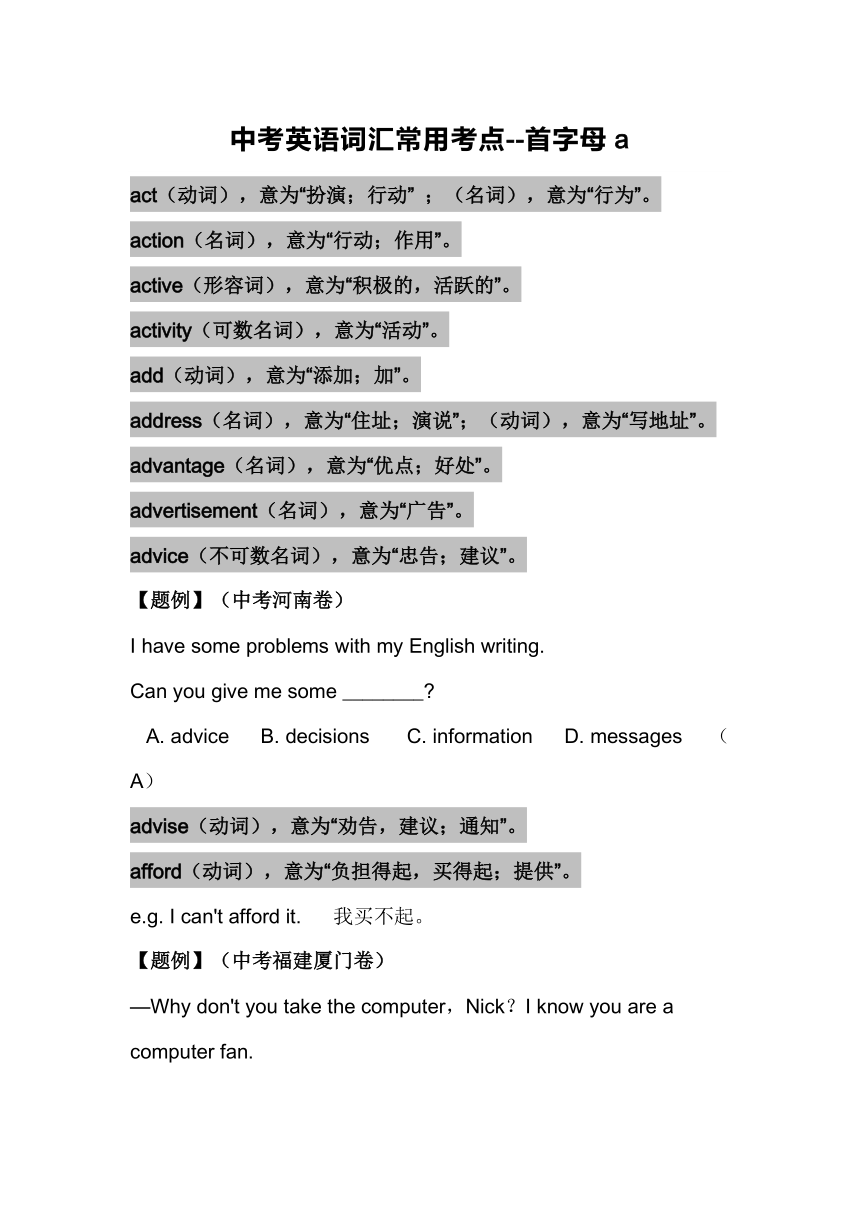 | |
| 格式 | docx | ||
| 文件大小 | 18.6KB | ||
| 资源类型 | 教案 | ||
| 版本资源 | 通用版 | ||
| 科目 | 英语 | ||
| 更新时间 | 2024-10-20 12:14:38 | ||
图片预览

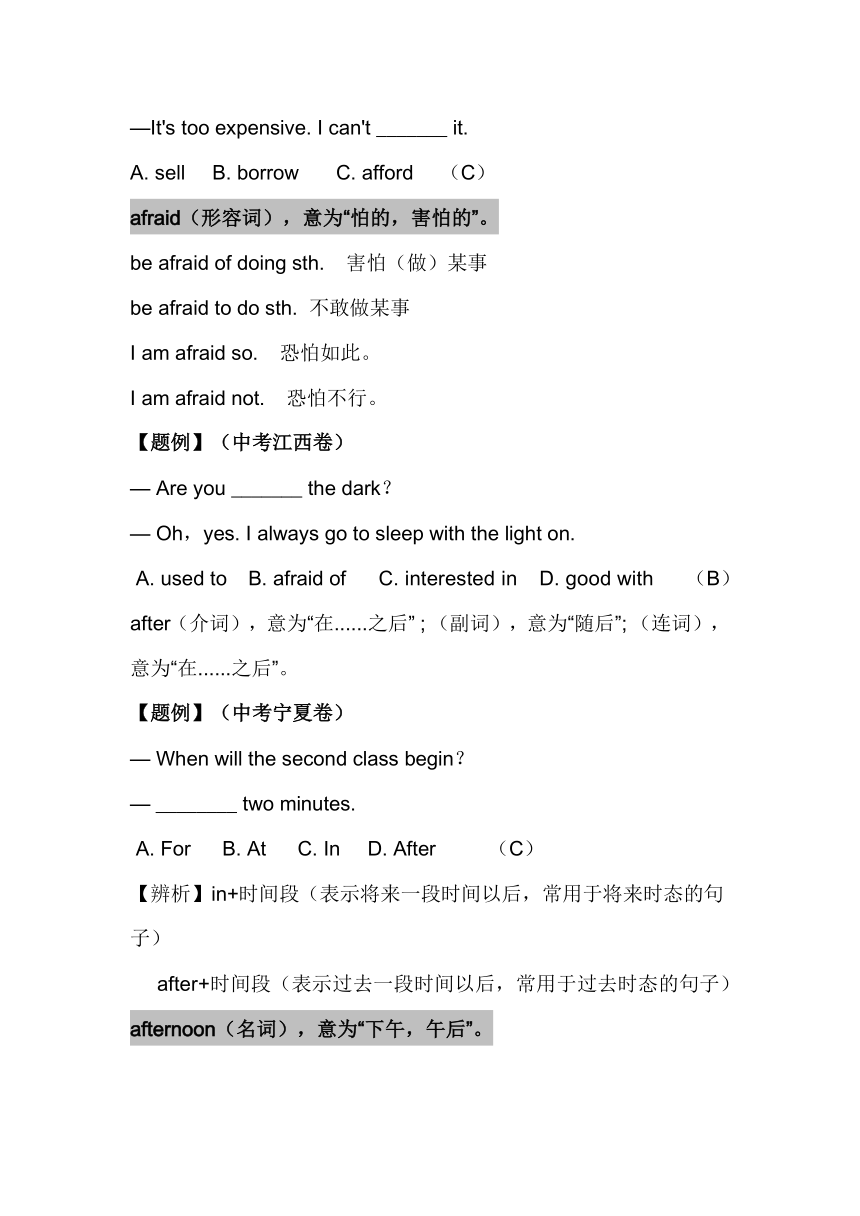
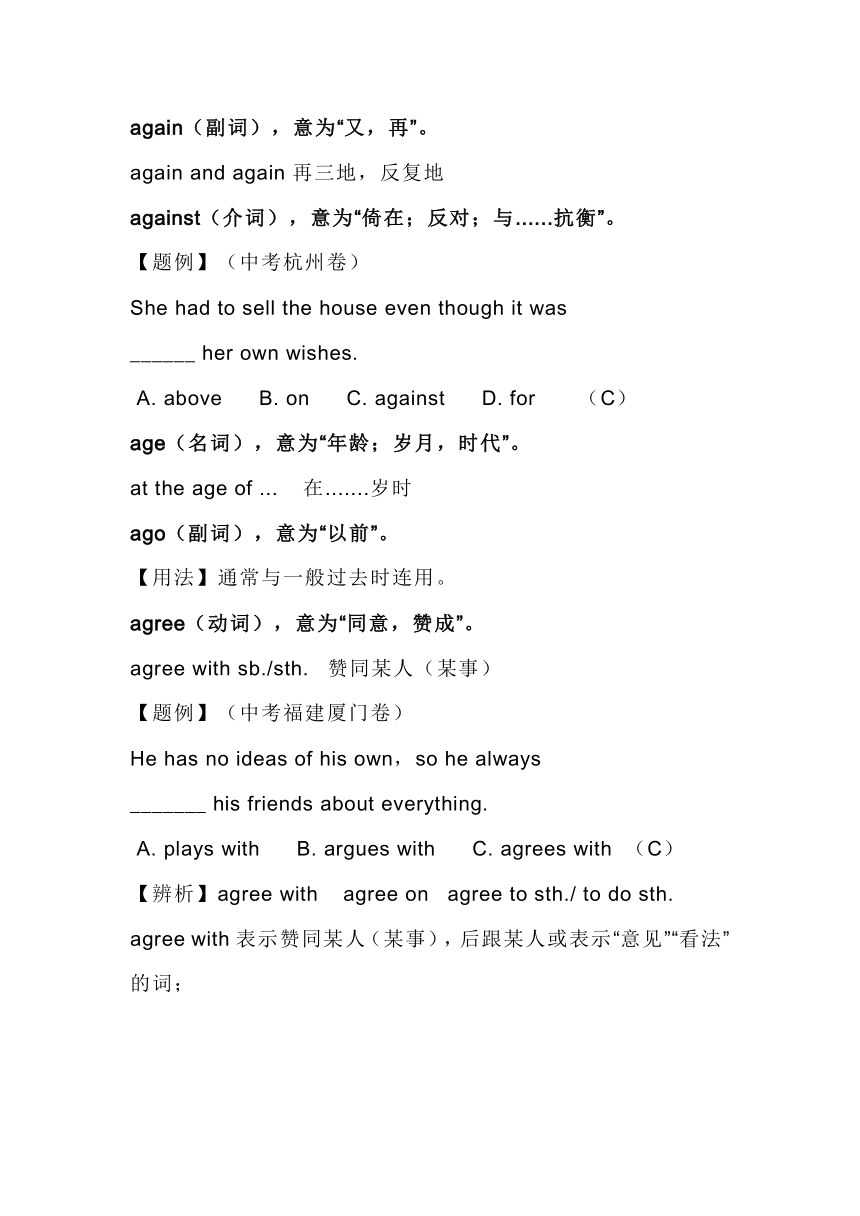
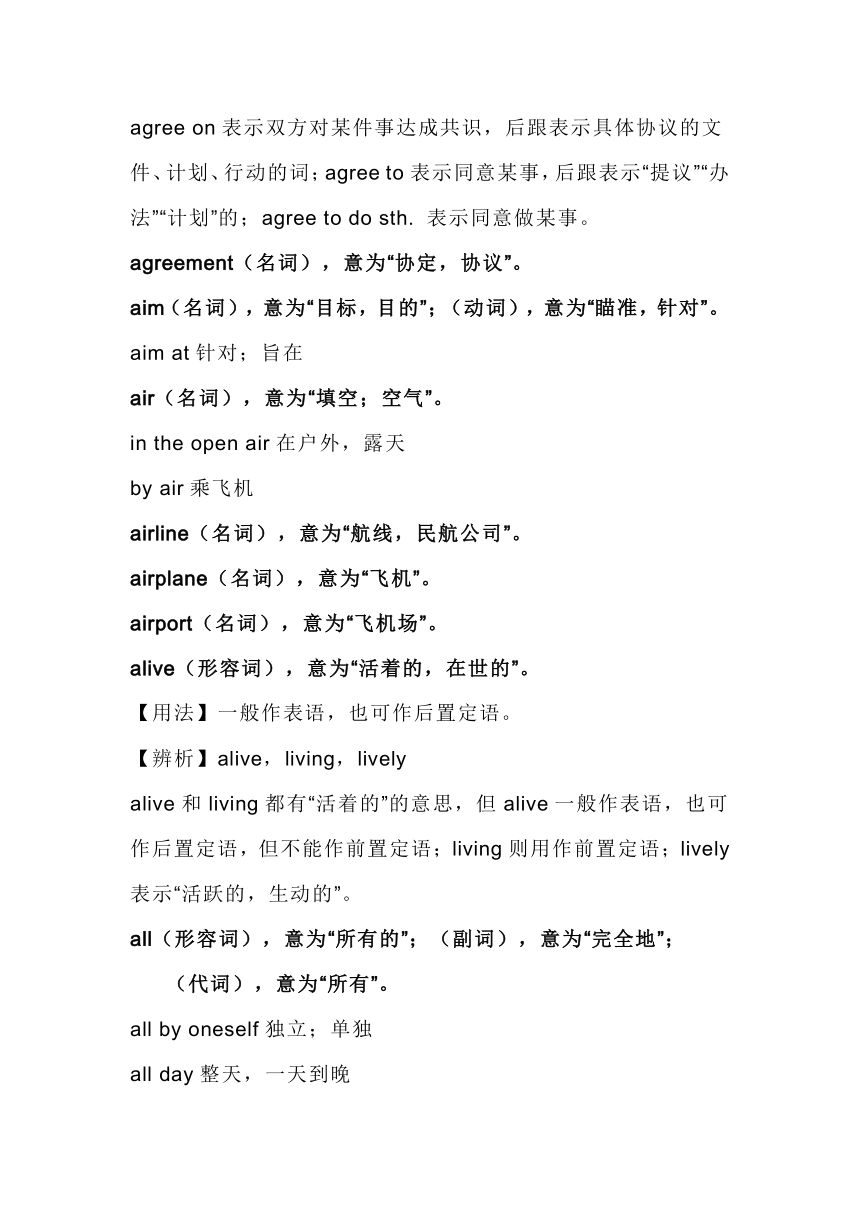
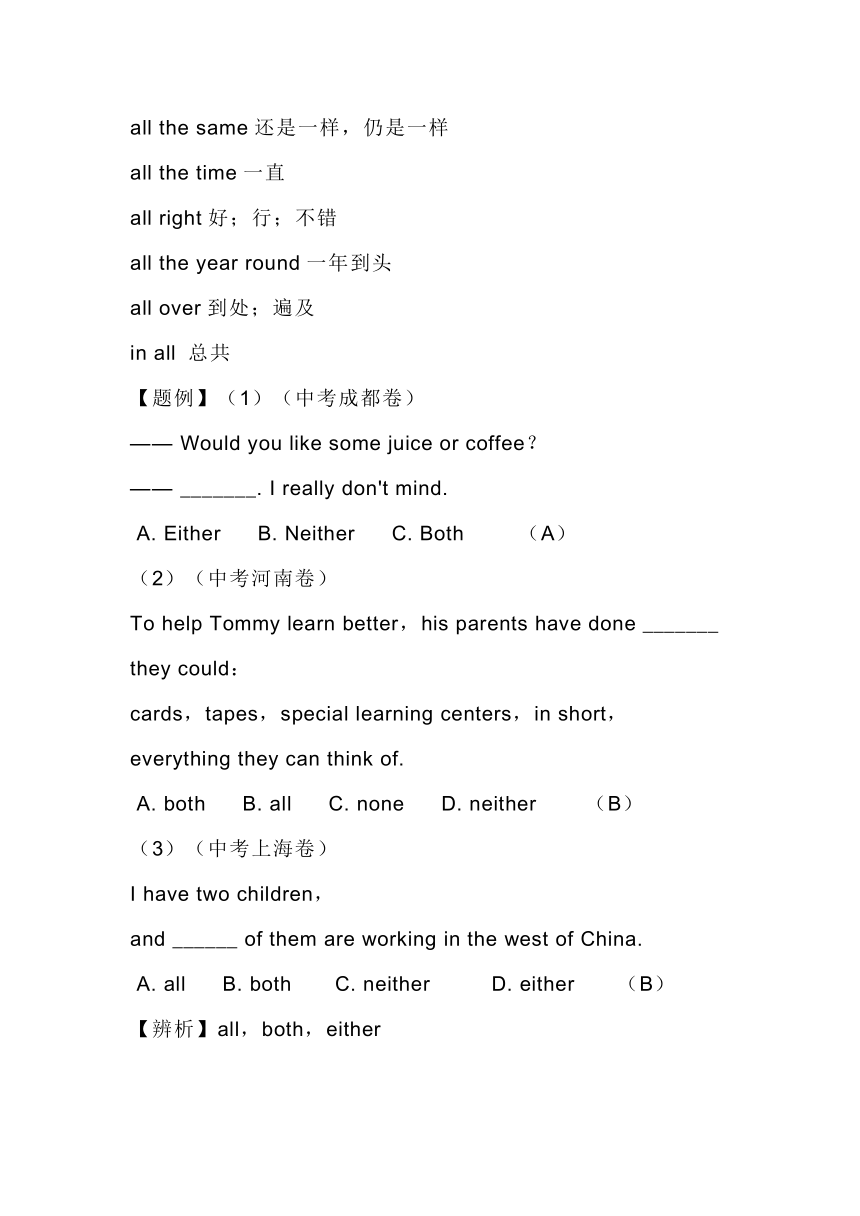
文档简介
中考英语词汇常用考点--首字母a
act(动词),意为“扮演;行动” ;(名词),意为“行为”。
action(名词),意为“行动;作用”。
active(形容词),意为“积极的,活跃的”。
activity(可数名词),意为“活动”。
add(动词),意为“添加;加”。
address(名词),意为“住址;演说”;(动词),意为“写地址”。
advantage(名词),意为“优点;好处”。
advertisement(名词),意为“广告”。
advice(不可数名词),意为“忠告;建议”。
【题例】(中考河南卷)
I have some problems with my English writing. Can you give me some ________
A. advice B. decisions C. information D. messages (A)
advise(动词),意为“劝告,建议;通知”。
afford(动词),意为“负担得起,买得起;提供”。
e.g. I can't afford it. 我买不起。
【题例】(中考福建厦门卷)
—Why don't you take the computer,Nick?I know you are a computer fan.
—It's too expensive. I can't _______ it.
A. sell B. borrow C. afford (C)
afraid(形容词),意为“怕的,害怕的”。
be afraid of doing sth. 害怕(做)某事
be afraid to do sth. 不敢做某事
I am afraid so. 恐怕如此。
I am afraid not. 恐怕不行。
【题例】(中考江西卷)
— Are you _______ the dark?
— Oh,yes. I always go to sleep with the light on.
A. used to B. afraid of C. interested in D. good with (B)
after(介词),意为“在......之后” ; (副词),意为“随后”; (连词),意为“在......之后”。
【题例】(中考宁夏卷)
— When will the second class begin?
— ________ two minutes.
A. For B. At C. In D. After (C)
【辨析】in+时间段(表示将来一段时间以后,常用于将来时态的句子)
after+时间段(表示过去一段时间以后,常用于过去时态的句子)
afternoon(名词),意为“下午,午后”。
again(副词),意为“又,再”。
again and again 再三地,反复地
against(介词),意为“倚在;反对;与......抗衡”。
【题例】(中考杭州卷)
She had to sell the house even though it was ______ her own wishes.
A. above B. on C. against D. for (C)
age(名词),意为“年龄;岁月,时代”。
at the age of ... 在.......岁时
ago(副词),意为“以前”。
【用法】通常与一般过去时连用。
agree(动词),意为“同意,赞成”。
agree with sb./sth. 赞同某人(某事)
【题例】(中考福建厦门卷)
He has no ideas of his own,so he always _______ his friends about everything.
A. plays with B. argues with C. agrees with (C)
【辨析】agree with agree on agree to sth./ to do sth.
agree with表示赞同某人(某事),后跟某人或表示“意见”“看法”的词;
agree on表示双方对某件事达成共识,后跟表示具体协议的文件、计划、行动的词;agree to表示同意某事,后跟表示“提议”“办法”“计划”的;agree to do sth. 表示同意做某事。
agreement(名词),意为“协定,协议”。
aim(名词),意为“目标,目的”;(动词),意为“瞄准,针对”。
aim at针对;旨在
air(名词),意为“填空;空气”。
in the open air在户外,露天
by air乘飞机
airline(名词),意为“航线,民航公司”。
airplane(名词),意为“飞机”。
airport(名词),意为“飞机场”。
alive(形容词),意为“活着的,在世的”。
【用法】一般作表语,也可作后置定语。
【辨析】alive,living,lively
alive和living都有“活着的”的意思,但alive一般作表语,也可作后置定语,但不能作前置定语;living则用作前置定语;lively表示“活跃的,生动的”。
all(形容词),意为“所有的”;(副词),意为“完全地”;
(代词),意为“所有”。
all by oneself独立;单独
all day整天,一天到晚
all the same还是一样,仍是一样
all the time一直
all right好;行;不错
all the year round一年到头
all over到处;遍及
in all 总共
【题例】(1)(中考成都卷)
—— Would you like some juice or coffee?
—— _______. I really don't mind.
A. Either B. Neither C. Both (A)
(2)(中考河南卷)
To help Tommy learn better,his parents have done _______ they could:
cards,tapes,special learning centers,in short,everything they can think of.
A. both B. all C. none D. neither (B)
(3)(中考上海卷)
I have two children,and ______ of them are working in the west of China.
A. all B. both C. neither D. either (B)
【辨析】all,both,either
all表示“三者或三者以上都”,修饰不可数名词时谓语动词用单数,修饰可数名词时谓语动词用复数;both表示“两者都”,谓语动词用复数形式;either表示“两者中任何一个”,谓语动词用单数形式。
allow(动词),意为“准许,允许”。
allow sb. to do sth. 允许某人做某事
【题例】(中考陕西卷)
Driving after drinking wine _______ in China.
A. allows B. doesn't allow
C. is allowed D. isn't allowed
almost(副词),意为“差不多,几乎”。
【辨析】almost,nearly
两者都含有“差不多,几乎”的意思,但almost可与表示否定意义的代词、名词连用,而nearly则不能。
alone(形容词),意为“单独的,只有”;(副词),意为“单独地”。
【题例】(中考兰州卷)
—— Are you afraid of ________ at home,Linda?
—— No,I have grown up.
A. alone B. being alone
C. lonely D. being lonely (B)
【辨析】alone lonely
alone用作形容词,强调数量上“独自一个人”,不含感彩,一般作表语而不作定语,它还可以用作副词;如:She lives alone,but she doesn't feel lonely. lonely只用作形容词,强调心理上“孤独”,有浓厚的伤感色彩,可作定语或表语。如:a lonely village 孤寂的村庄。
along(副词),意为“向前”;(介词),意为“沿着,顺着”。
aloud(副词),意为“大声地”。
already(副词),意为“已经”。
He has already got up. 他已经起床了。
【用法】(1)常用在肯定句中,和完成时连用;
(2)也可用在疑问句中,表示惊讶的语气。
also(副词),意为“也”。
【辨析】also too either as well
also,too和as well用在肯定句中,also用于助动词之后,行为动词之前;too一般放在句末,前边用逗号隔开;as well多用于口语,只用于句末,前面不用逗号隔开。either用于否定句,通常放在句末,前面用逗号隔开。
although(连词),意为“尽管,即使”。
【用法】(1)引导让步状语从句,可放于句首或句中。
如:Although our teacher is very strict with us,she is still a good teacher.
虽然我们的老师对我们很严格,但她仍是一个好老师。
(2)不与but连用。
【题例】(中考天津卷)
________ they arrived early at the airport,they nearly missed their flight.
A. If B. Because
C. As soon as D. Although (D)
always(副词),意为“总是,一直”。
【用法】(1)always通常位于助动词、系动词、情态动词之后,行为动词之前;
(2)not always表示部分否定。
a.m.(A.M.) 午前,上午
America(名词),意为“美国,美洲”。
American(形容词),意为“美国的,美洲的”;(名词),意为“美国人,美洲人”。
among(介词),意为“在(三者或三者以上)之中,是......其中之一”。
【题例】(1)(中考河南卷)
If you try to sit on two chairs,you will fall _______ them. For life,you must choose one chair.
A. between B. under
C. among D. into (A)
析:此处强调两把椅子之间,故用between。
(2)(中考江苏南通卷)
Our English teacher was standing ________ us so that she could hear us all clearly.
A. away from B. far behind
C. between D. among
【辨析】among表示三者后三者以上之间,between则表示两者之间。如:
Between us,she is taller.
我和他之中,他更高一点儿。
ancient(形容词),意为“古代的;古老的”。
and(连词),意为“和;又”
and so on 等等
【用法】(1)用于连续两个或两个以上语法作用相同的词、短语或句子;
(2)用于两个动词之间,表示连续、反复;
(3)连接两个数字,表示“加”,谓语动词用单数。
【题例】(中考重庆卷)
John,work hard ________ you will make much progress.
A. or B. nor
C. but D. and (D)
angry(形容词),意为“生气的,愤怒的”。
be angry with sb. 对某人生气,发脾气
animal(名词),意为“动物,野兽”。
another(形容词),意为“又一,再一;别的,不同的”;
(代词),意为“另一个”。
one after another 一个接一个
【用法】(1)表示三者或三者以上的另一个,又一个。
如:Could you answer me another question?
你能再回答我一个问题吗?
(2)句型“another+基数词+可数名词复数”表示“再......”,
等同于“基数词+more+可数名词复数”。
如:我们想再买三本书。
We wanted another three books.
We wanted three more books.
【题例】(中考哈尔滨卷)
—— Harbin is really a beautiful city and there are many places of interest.
—— So it is. Why not stay here for _______ two days?
A. other B. others
C. another (C)
answer(名词),意为“答案,回答”;(动词),意为“回答,答复”。
act(动词),意为“扮演;行动” ;(名词),意为“行为”。
action(名词),意为“行动;作用”。
active(形容词),意为“积极的,活跃的”。
activity(可数名词),意为“活动”。
add(动词),意为“添加;加”。
address(名词),意为“住址;演说”;(动词),意为“写地址”。
advantage(名词),意为“优点;好处”。
advertisement(名词),意为“广告”。
advice(不可数名词),意为“忠告;建议”。
【题例】(中考河南卷)
I have some problems with my English writing. Can you give me some ________
A. advice B. decisions C. information D. messages (A)
advise(动词),意为“劝告,建议;通知”。
afford(动词),意为“负担得起,买得起;提供”。
e.g. I can't afford it. 我买不起。
【题例】(中考福建厦门卷)
—Why don't you take the computer,Nick?I know you are a computer fan.
—It's too expensive. I can't _______ it.
A. sell B. borrow C. afford (C)
afraid(形容词),意为“怕的,害怕的”。
be afraid of doing sth. 害怕(做)某事
be afraid to do sth. 不敢做某事
I am afraid so. 恐怕如此。
I am afraid not. 恐怕不行。
【题例】(中考江西卷)
— Are you _______ the dark?
— Oh,yes. I always go to sleep with the light on.
A. used to B. afraid of C. interested in D. good with (B)
after(介词),意为“在......之后” ; (副词),意为“随后”; (连词),意为“在......之后”。
【题例】(中考宁夏卷)
— When will the second class begin?
— ________ two minutes.
A. For B. At C. In D. After (C)
【辨析】in+时间段(表示将来一段时间以后,常用于将来时态的句子)
after+时间段(表示过去一段时间以后,常用于过去时态的句子)
afternoon(名词),意为“下午,午后”。
again(副词),意为“又,再”。
again and again 再三地,反复地
against(介词),意为“倚在;反对;与......抗衡”。
【题例】(中考杭州卷)
She had to sell the house even though it was ______ her own wishes.
A. above B. on C. against D. for (C)
age(名词),意为“年龄;岁月,时代”。
at the age of ... 在.......岁时
ago(副词),意为“以前”。
【用法】通常与一般过去时连用。
agree(动词),意为“同意,赞成”。
agree with sb./sth. 赞同某人(某事)
【题例】(中考福建厦门卷)
He has no ideas of his own,so he always _______ his friends about everything.
A. plays with B. argues with C. agrees with (C)
【辨析】agree with agree on agree to sth./ to do sth.
agree with表示赞同某人(某事),后跟某人或表示“意见”“看法”的词;
agree on表示双方对某件事达成共识,后跟表示具体协议的文件、计划、行动的词;agree to表示同意某事,后跟表示“提议”“办法”“计划”的;agree to do sth. 表示同意做某事。
agreement(名词),意为“协定,协议”。
aim(名词),意为“目标,目的”;(动词),意为“瞄准,针对”。
aim at针对;旨在
air(名词),意为“填空;空气”。
in the open air在户外,露天
by air乘飞机
airline(名词),意为“航线,民航公司”。
airplane(名词),意为“飞机”。
airport(名词),意为“飞机场”。
alive(形容词),意为“活着的,在世的”。
【用法】一般作表语,也可作后置定语。
【辨析】alive,living,lively
alive和living都有“活着的”的意思,但alive一般作表语,也可作后置定语,但不能作前置定语;living则用作前置定语;lively表示“活跃的,生动的”。
all(形容词),意为“所有的”;(副词),意为“完全地”;
(代词),意为“所有”。
all by oneself独立;单独
all day整天,一天到晚
all the same还是一样,仍是一样
all the time一直
all right好;行;不错
all the year round一年到头
all over到处;遍及
in all 总共
【题例】(1)(中考成都卷)
—— Would you like some juice or coffee?
—— _______. I really don't mind.
A. Either B. Neither C. Both (A)
(2)(中考河南卷)
To help Tommy learn better,his parents have done _______ they could:
cards,tapes,special learning centers,in short,everything they can think of.
A. both B. all C. none D. neither (B)
(3)(中考上海卷)
I have two children,and ______ of them are working in the west of China.
A. all B. both C. neither D. either (B)
【辨析】all,both,either
all表示“三者或三者以上都”,修饰不可数名词时谓语动词用单数,修饰可数名词时谓语动词用复数;both表示“两者都”,谓语动词用复数形式;either表示“两者中任何一个”,谓语动词用单数形式。
allow(动词),意为“准许,允许”。
allow sb. to do sth. 允许某人做某事
【题例】(中考陕西卷)
Driving after drinking wine _______ in China.
A. allows B. doesn't allow
C. is allowed D. isn't allowed
almost(副词),意为“差不多,几乎”。
【辨析】almost,nearly
两者都含有“差不多,几乎”的意思,但almost可与表示否定意义的代词、名词连用,而nearly则不能。
alone(形容词),意为“单独的,只有”;(副词),意为“单独地”。
【题例】(中考兰州卷)
—— Are you afraid of ________ at home,Linda?
—— No,I have grown up.
A. alone B. being alone
C. lonely D. being lonely (B)
【辨析】alone lonely
alone用作形容词,强调数量上“独自一个人”,不含感彩,一般作表语而不作定语,它还可以用作副词;如:She lives alone,but she doesn't feel lonely. lonely只用作形容词,强调心理上“孤独”,有浓厚的伤感色彩,可作定语或表语。如:a lonely village 孤寂的村庄。
along(副词),意为“向前”;(介词),意为“沿着,顺着”。
aloud(副词),意为“大声地”。
already(副词),意为“已经”。
He has already got up. 他已经起床了。
【用法】(1)常用在肯定句中,和完成时连用;
(2)也可用在疑问句中,表示惊讶的语气。
also(副词),意为“也”。
【辨析】also too either as well
also,too和as well用在肯定句中,also用于助动词之后,行为动词之前;too一般放在句末,前边用逗号隔开;as well多用于口语,只用于句末,前面不用逗号隔开。either用于否定句,通常放在句末,前面用逗号隔开。
although(连词),意为“尽管,即使”。
【用法】(1)引导让步状语从句,可放于句首或句中。
如:Although our teacher is very strict with us,she is still a good teacher.
虽然我们的老师对我们很严格,但她仍是一个好老师。
(2)不与but连用。
【题例】(中考天津卷)
________ they arrived early at the airport,they nearly missed their flight.
A. If B. Because
C. As soon as D. Although (D)
always(副词),意为“总是,一直”。
【用法】(1)always通常位于助动词、系动词、情态动词之后,行为动词之前;
(2)not always表示部分否定。
a.m.(A.M.) 午前,上午
America(名词),意为“美国,美洲”。
American(形容词),意为“美国的,美洲的”;(名词),意为“美国人,美洲人”。
among(介词),意为“在(三者或三者以上)之中,是......其中之一”。
【题例】(1)(中考河南卷)
If you try to sit on two chairs,you will fall _______ them. For life,you must choose one chair.
A. between B. under
C. among D. into (A)
析:此处强调两把椅子之间,故用between。
(2)(中考江苏南通卷)
Our English teacher was standing ________ us so that she could hear us all clearly.
A. away from B. far behind
C. between D. among
【辨析】among表示三者后三者以上之间,between则表示两者之间。如:
Between us,she is taller.
我和他之中,他更高一点儿。
ancient(形容词),意为“古代的;古老的”。
and(连词),意为“和;又”
and so on 等等
【用法】(1)用于连续两个或两个以上语法作用相同的词、短语或句子;
(2)用于两个动词之间,表示连续、反复;
(3)连接两个数字,表示“加”,谓语动词用单数。
【题例】(中考重庆卷)
John,work hard ________ you will make much progress.
A. or B. nor
C. but D. and (D)
angry(形容词),意为“生气的,愤怒的”。
be angry with sb. 对某人生气,发脾气
animal(名词),意为“动物,野兽”。
another(形容词),意为“又一,再一;别的,不同的”;
(代词),意为“另一个”。
one after another 一个接一个
【用法】(1)表示三者或三者以上的另一个,又一个。
如:Could you answer me another question?
你能再回答我一个问题吗?
(2)句型“another+基数词+可数名词复数”表示“再......”,
等同于“基数词+more+可数名词复数”。
如:我们想再买三本书。
We wanted another three books.
We wanted three more books.
【题例】(中考哈尔滨卷)
—— Harbin is really a beautiful city and there are many places of interest.
—— So it is. Why not stay here for _______ two days?
A. other B. others
C. another (C)
answer(名词),意为“答案,回答”;(动词),意为“回答,答复”。
